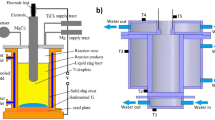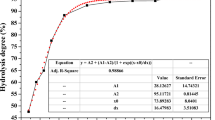Abstract
THE kinetic behaviour in the initial stages of the polymerization of propylene with titanium trichloride–triethyl aluminium can be divided into two types: the build-up type (the rate increases to the stationary value) and the decay type (the rate approaches decreasingly to the value). Natta and Pasquon1 observed that the build-up type changed into the other type as grinding the titanium trichloride, whereas the stationary rate did not change, and supposed that the produced polymer adjusted the particle size of titanium trichloride into the stationary value appropriate for the stationary polymerization. This supposition is based on the experimental result that the same stationary rate per unit weight of titanium trichloride was obtained with the use of the titanium trichloride catalysts in various particle sizes.
This is a preview of subscription content, access via your institution
Access options
Subscribe to this journal
Receive 51 print issues and online access
$199.00 per year
only $3.90 per issue
Buy this article
- Purchase on Springer Link
- Instant access to full article PDF
Prices may be subject to local taxes which are calculated during checkout
Similar content being viewed by others
References
Natta, G., and Pasquon, I., Adv. Catalysis, 11, 1 (1959).
Keii, T., Nature, 196, 160 (1962).
Author information
Authors and Affiliations
Rights and permissions
About this article
Cite this article
KEII, T., AKIYAMA, T. Role of Grinding of Titanium Trichloride in Natta's Polymerization. Nature 203, 76–77 (1964). https://doi.org/10.1038/203076a0
Published:
Issue Date:
DOI: https://doi.org/10.1038/203076a0
Comments
By submitting a comment you agree to abide by our Terms and Community Guidelines. If you find something abusive or that does not comply with our terms or guidelines please flag it as inappropriate.



